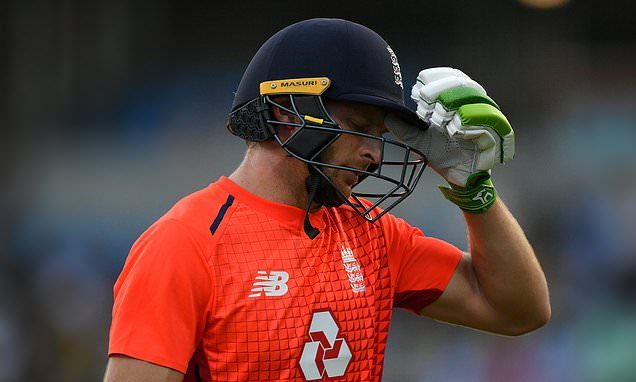England in dire need of doing away with Jos Buttler experiment for own good
Sometimes you tend to look at experiments - or strategic moves - by captains on a cricket field and, no matter what potential it has to be successful, you get a gut feeling that it just is wrong. The tactic to elevate Jos Buttler to the opening slot in T20Is seems like an epitome of such a move.

It makes you clench your fists, punch an imaginary bag and yell at the television - “WHY???”. The feeling was no different on Friday, when Buttler nicked a wide one off the bowling of Lungi Ngidi and had to depart with 17 overs still left in the England innings. Such a dismissal makes you go “WHY?” but more than dismissal, it is the decision to open with Buttler in the first place that is abstruse and makes you question the captain, the management and their thought process.
In many ways, opening with Buttler in T20s is a ploy you can totally understand; this is a guy who has proven in the past - in his Rajasthan Royals stint in the IPL - that he can be an absolute monster up top and decimate bowlers from the word go; he can utilize the batting powerplay to the fullest and should he get his eye in, will basically ensure the team is 0/70 at the end of the 6th over. Due to his six-hitting ability, he also poses the threat of going big when the fielding restrictions are lifted, hence the temptation to open with him is totally comprehensible and justified. But why England, of all teams, should opt for such a tactic is what’s flabbergasting.
For starters, the team, in the form of Jason Roy, Jonny Bairstow, David Malan and Tom Banton have four world-class openers who would walk right into the starting XI of many an international side. Add Alex Hales and the prolific yet underrated James Vince into the mix and you have a total of six openers who are single handedly capable of winning matches on their own and have proven the same in the past, both at the international stage and in franchise cricket. By elevating Buttler to the top of the order, England are effectively nullifying the threat of their openers by dropping them down the order and making them bat out of position, a less than ideal scenario for both the team and the individuals involved.
A much more simpler yet sound solution, one would imagine, would be to use Buttler as a floater-cum-finisher in the XI, a move that would not only polish the middle-order and add more bite, texture and structure to it, but also help add more clarity to the roles of the openers; a Roy wouldn’t have to worry about whether he should be the aggressor or play second-fiddle whist batting with Buttler; a Bairstow wouldn’t need to be unnecessarily adapting his game to bat at the No.3 spot. That Roy and Bairstow share inimitable chemistry amongst them - they have scored over 2300 runs in ODIs and have put together 11 hundred-run partnerships in just 35 ODI innings - makes it so much more an obvious decision for the management to make.
But a damning indication of why Buttler belongs to the middle-order, or rather why England need him to bat there, perhaps was seen in the first T20I in East London. At 95/2 after 10 overs chasing 178, with the platform set by the top three, the job at hand seemed a pretty straightforward one for Morgan’s men, yet all they could manage in the last 10 was 71 more runs, with the middle-order of Joe Denly, Ben Stokes and Moeen Ali - barring Morgan who scored a fifty - managing to add just 12 runs between the three of them, something that eventually led to a one-run loss.
It was a clear indication of the lack of clarity in the roles of the batsmen, with all three of Stokes, Denly and Ali being overwhelmed by the ‘finisher’ tag that’d been put on them having not done it in the past. They almost faltered in the 2nd T20I in Durban too - after being reduced from 78-2 in 8 overs to 125-4 in 15 overs - before being rescued by a freak knock from Moeen Ali.
Stokes, in particular, one must imagine, is being heavily affected by the absence of Buttler in the middle-order, with the load of finishing the innings falling on his shoulders owing to his seniority. For all his prowess in the ODI and the Test formats, the all-rounder has hardly shone with the bat in the shortest format, at least at the international level, with him averaging under 18, having batted just 22 times. The 30-ball 47 in Durban was, in fact, his highest ever score in T20Is and that, too, as I’d like to put it, was not one of his more ‘fluent’ knocks.
For a batsman who is still learning his trade in the format, the responsibility of finishing games - both whilst setting targets and chasing - could be arduous and that, clearly, is reflecting in Stokes’ batting. You’d also think that he’d be much better off trying to express himself without being chained and hence, a presence of a Buttler might make the job at hand with bat all the more easier for Stokes, thus, in turn, making him all the more dangerous.
By asking Buttler to open, England are putting him - and themselves - inside a box and are, in many ways, restricting the whole side from exploring its full potential. You look around the cricketing world and you could find at least ten, if not fifteen, openers - be it Rohit Sharma, Aaron Finch, David Warner, Quinton de Kock, Shikhar Dhawan, Jason Roy or Martin Guptill - who could be as destructive as Buttler whilst opening the batting, but batsmen who can do a job in the middle-order and finish games off with elan like he can are few and far between. That he can open the batting and do a fine job there is a testament to his ability, but England, by utilizing Buttler up-top, are all but stripping him off his magic powers; a wizard in the middle-order who becomes a mere muggle whilst pushed to the top.
Whether the move to open with Buttler is a long-term ploy or a mere experiment remains to be seen, but at this point of time, it does not seem like one that will help the team bear fruit. The World T20 puzzle seemed complete and it looked like England just needed to fit in a couple of pieces, but now, they are at the risk of messing everything up in an attempt to unnecessarily rearrange it.

Comments
Sign up or log in to your account to leave comments and reactions
0 Comments